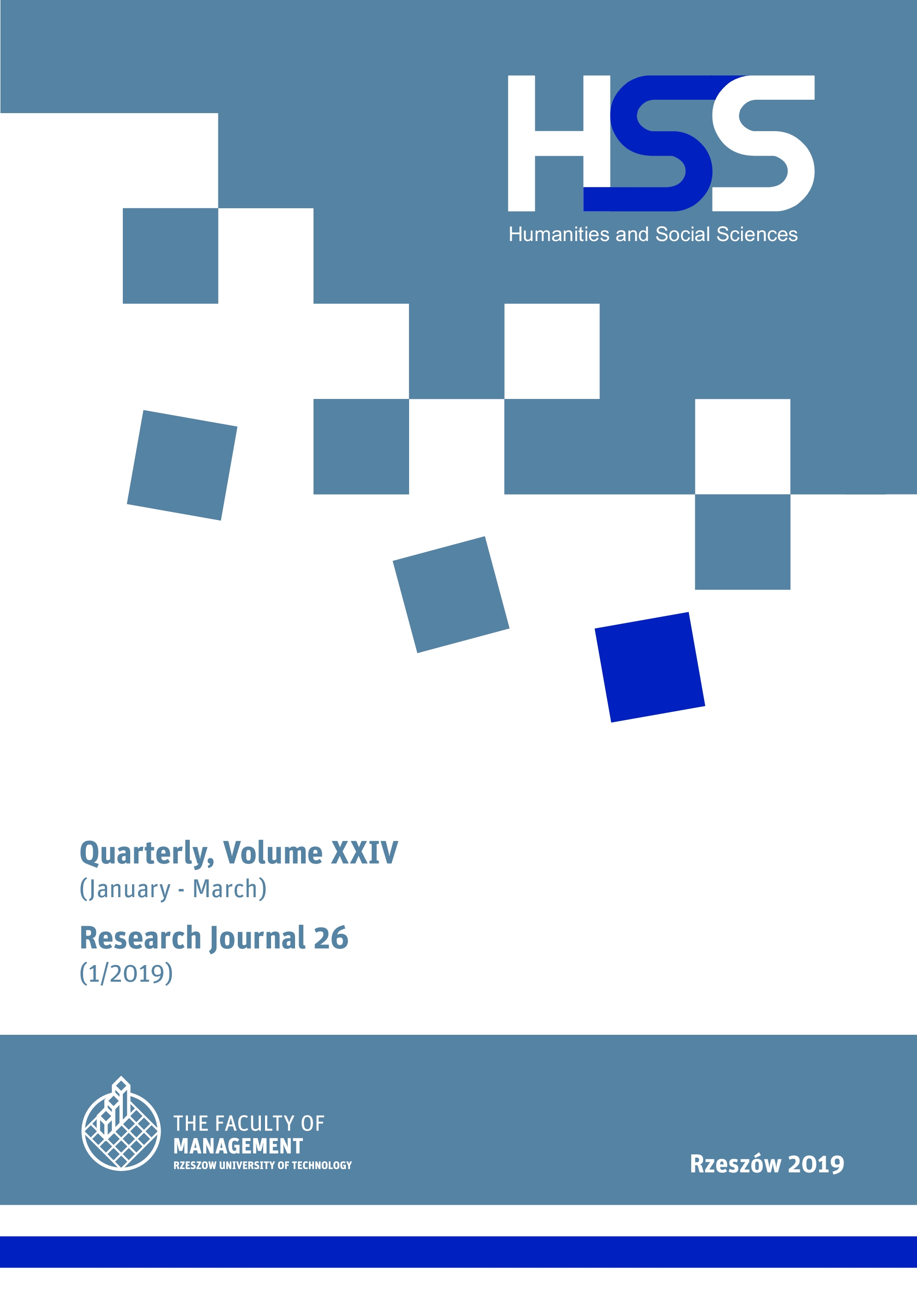Abstrakt
The authors’ considerations are based on the hypothesis that contemporary capitalism is not the recreation of 19th century free market capitalism but an ideological system supporting mainly the interests of multinational companies. The neoliberal agenda is based also on cultural foundations and peoples’ economic choices are influenced by cultural factors. The overarching logic of neoliberal capitalism boils down to profit maximization and consumption. When this logic was internalized by people, they became unconscious followers of the rules imposed upon them by capital owners. According to neoliberal ideology, corporate culture should to be applied to every domain of personal and social life. Interpersonal relations and marriage have become commodified as well. As a result, the state of mental health of the population has worsened and people have failed to achieve lasting satisfaction. The purpose of the paper is to demonstrate from sociological point of view in what way neoliberal values pervade numerous dom
Bibliografia
Baudrillard, J. (1999). The Consumer Society: Myths and Structures. London: Sage.
Beck, U., Beck-Gernsheim, E. (1995). The Normal Chaos of Love. Cambridge: Wiley.
Blyth, M., Lonergan, E. (2014). Print Less But Transfer More: Why Central Banks Should Give Money Directly to the People. Foreign Affairs 93(5), [accessed: 26.04.2016]. Access on the internet: https://www.foreignaffairs.com/articles/united-states/2014-08-11/print-less-transfer-more.
Borofsky, N. (2013). Bailout: How Washington Abandoned Main Street While Rescuing Wall Street. New York: Free Press.
Bourdieu, P. (1984). Distinction: A Social Critique of the Judgment of Taste. London: Routledge and Kegan Paul.
—— (2005). Principles of economic anthropology [In:] Smelser N.J., R. SwedbergR., Eds., The Handbook of Economic Sociology. Princeton: Princeton University Press, p. 75–89.
Bryman, A. (1995). Disney and his Worlds. New York: Routledge.
Carrigan, P. (1997). The Sociology of Consumption: An Introduction. London: Sage.
Cussack, C.M., Digance, J. (2008). “Shopping for a Self”: Pilgrimage, Identity-formation and Retail Therapy [In:] John G.St. ed., Victor Turner and Contemporary Cultural Performance. New York: Berghahn Books, p. 227–241.
Czubocha, K. (2012). Age Discrimination in the Context of Globalization, Modernization and the Labor Market [In:] Zieliński Z.E. ed., Rola informatyki w naukach ekonomicznych i społecznych. Kielce: Wyższa Szkoła Handlowa w Kielcach, p. 216–222.
Faik, J. (2015). Global Economic Accounting and Its Critics: Objective Approaches [In:] Glatzer W., Camfield L., Møller V., Rojas M., Global Handbook of Quality of Life: Exploration of Well-Being of Nations and Continents. Dordrecht–Heidelberg–New York–London: Springer, p. 115–131.
Fekete, A. (2014). The Counterproductive Monetary Policy of the Fed: Sowing Inflation, Reaping Deflation, p. 1–16 [accessed: 15.03.2015]. Access on the internet: http://www.professorfekete.com/articles/AEFCounterProd MonetaryPol Fed.pdf.
Fromm, E. (1999). Mieć czy być. Poznań: Wyd. Rebis.
Giardina, M.D., Newman, J.I. (2014). The Politics of Research [In:] Leavy P., ed., The Oxford Handbook of Qualitative Research, Oxford–New York: Oxford University Press, p. 699–723.
Giroux, H. (2000). Impure Acts: The Practical Politics of Cultural Studies. New York: Routledge.
—— (2002). Neoliberalism, Corporate Culture, and the Promise of Higher Education: The University as a Democratic Public Sphere. “Harvard Educational Review” 72(4), p. 425-464.
—— (2006). America on the Edge: Henry Giroux on Politics, Culture, and Education. New York: Palgrave Macmillan.
Herzfeld, M. (2004). Antropologia. Praktykowanie teorii w kulturze i społeczeństwie. Kraków: Wydawnictwo Uniwersytetu Jagiellońskiego.
Holt, D.B, Schor, J.B. (2000). Introduction. Do Americans Consume Too Much? [In:] Holt D.B., Schor J.B., eds., The Consumer Society Reader). New York: The New Press, p. vii–xxiii.
House, E.R. (2014). Ewolucja jakościowa i zmiana polityki społecznej [In:] Denzin N.K., Y.S. Lincoln Y.S., eds., Metody badań jakościowych: vol. 2. Warszawa: PWN, p. 603–616.
Illouz, E. (1997). Consuming the Romantic Utopia: Love and the Cultural Contradictions of Capitalism. Berkeley: University of California Press.
Jameson, F. (1984). Post-Postmodernism: or, The Cultural Logic of Late Capitalism. “New Left Review” 146, p. 53-93.
—— (1985). Postmodernism and Consumer Society [In:] Foster H., ed., Postmodern Culture. London: Pluto Press, p. 111–125.
Loytard, J.F. (1984). The Postmodern Condition: A Report on Knowledge. Manchester: Manchester University Press.
Mercille, J. (2015). The Political Economy and Media Coverage of the European Economic Crisis: The Case of Ireland. Abingdon: Routledge.
Miles, S. (2006). Consumerism: As a Way of Life. London: Sage.
N.R. Goodwin, Ackerman, F., Kiron, D., eds. (1997). The Consumer Society. Washington: Island Press.
Plehwe, D. Walpen, B. (2006). Between Network and Complex Organization: The Making of Neoliberal Knowledge and Hegemony [In:] Plehwe D., Walpen B., Neuhoffer G., eds., Neoliberal Hegemony: A Global Critique. Abingdon: Routledge, p. 27–50.
Ritzer, G. (2004). Magiczny świat konsumpcji. Warszawa: Wyd. Muza.
Rojek, Ch. (1995). Decentering Leisure: Rethinking Leisure Theory. London: Sage.
—— (2013). Capitalism and Leisure Theory. Abingdon: Routledge.
Schor, J. (1993). The Overworked American: The Unexpected Decline of Leisure. New York: Basic Books.
Schumaker, J.F. (2001). The Age of Insanity: Modernity and Mental Health. Westport: Praeger.
Senett, R. (1998). The Corrosion of Character: The Personal Consequences of Work in the New Capitalism. New York–London: W.W. Norton & Company.
—— (2006). The Culture of New Capitalism. New Haven: Yale University Press.
Sharpley, R., Stone P.R. (2011). Introduction. Thinking about the Tourist Experience [In:] R. Sharpley R., Stone P.R., eds., Tourist Experience: Contemporary Perspectives. Abingdon: Routledge, p. 1–8.
Smith, J.K., Hodkinson, P. (2014). Relatywizm, kryteria i polityka [In:] N.K. Denzin N.K., Lincoln Y.S., eds., Metody badań jakościowych, vol. 2. Warszawa: PWN, p. 403–413.
Stebbin, R.A. (2008). Serious Leisure: A Perspective for Our Time. New Brunswick: Transaction Publishers.
Stevenson, N. (2006). Fashion. [In:] Turner B.S., ed., The Cambridge Dictionary of Sociology. Cambridge: Cambridge University Press, p. 197–198.
Swedberg, R. (2003). Principles of Economic Sociology. Princeton: Princeton University Press.
Szul, E. (2006). Konsumpcja jako forma zniewolenia człowieka. „Jarosławskie Studia Społeczne” 1, p. 81–92.
Turner, B.S. (2011). Religion and Modern Society: Citizenship, Secularization and the State. Cambridge: Cambridge University Press.
Warde, A. (2006). Consumption [In:] Turner B.S., eds., Cambridge Dictionary of Sociology. Cambridge: Cambridge University Press, p. 88–90.
Weeks, J. (2013). Economics of the 1%: How Mainstream Economics Serves the Rich, Obscures Reality and Distorts Policy. London–New York: Anthem Press.
Wisman, J.D. (2013). Wage Stagnation, Rising Inequality and the Financial Crisis of 2008. “Cambridge Journal of Economics” 37(4), 921–945.


